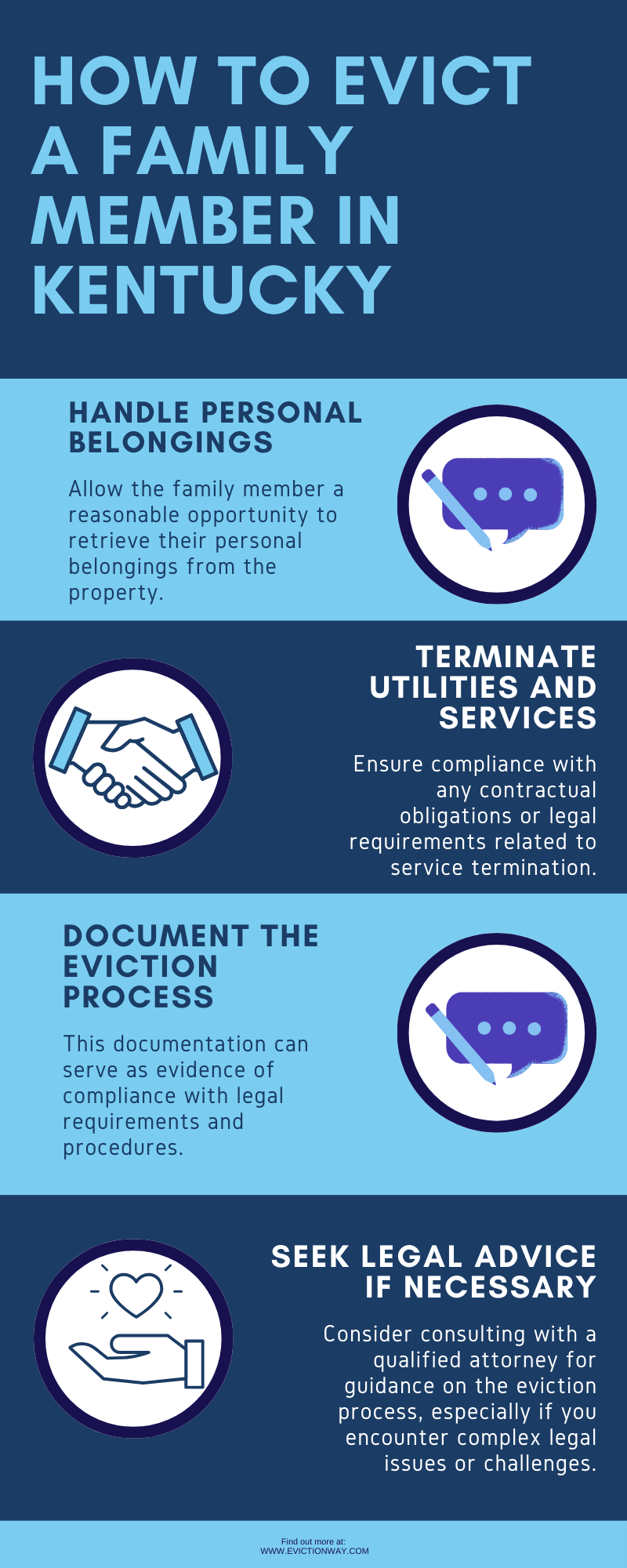If you’re struggling to evict a family member in Kentucky, you’re not alone. It can be a difficult and emotional process, but it’s important to know your rights and options. In this blog post, we’ll share the best way to evict a family member in Kentucky, and we’ll provide tips on doing it politely and legally.
First, it’s important to understand the law. In Kentucky, you can evict a family member if they are not paying rent, if they are causing damage to the property, or if they are engaging in illegal activities. You can also evict a family member if they have violated the terms of their lease.

If you’re considering evicting a family member, it’s important to talk to an attorney. An attorney can help you understand your rights and options, and they can help you draft the necessary paperwork. You can also contact your local legal aid office for assistance.
How To Evict a Family Member In Kentucky
Evicting a family member can be a difficult and emotional process, but it is sometimes necessary to protect your rights and property. If you are considering evicting a family member in Kentucky, it is important to understand the legal process and your rights as a landlord.
1. Give Proper Notice
The first step in evicting a family member is to give them proper notice. In Kentucky, you must give the tenant at least 30 days’ written notice to vacate the property. The notice must state the reason for the eviction and the date by which the tenant must vacate the property.
2. File a Complaint with the Court
If the tenant does not vacate the property after receiving the notice, you will need to file a complaint with the court. The complaint should state the facts of the case and the relief you are seeking, such as an order of eviction.
3. Serve the Tenant with the Complaint
Once you have filed the complaint, you will need to serve the tenant with a copy of the complaint and a summons. The summons will inform the tenant of the date and time of the hearing on the eviction case.

4. Attend the Hearing
On the day of the hearing, you will need to attend court and present your case to the judge. The tenant will also have the opportunity to present their case. The judge will then make a decision based on the evidence presented.
5. Obtain a Writ of Possession
If the judge rules in your favor, you will be issued a writ of possession. This document gives the sheriff the authority to remove the tenant from the property.
6. Evict the Tenant
Once you have obtained a writ of possession, you can have the sheriff evict the tenant from the property. The sheriff will typically give the tenant a few days to vacate the property before forcibly removing them.
Additional Resources for Kentucky eviction help:
30 days Eviction notice Kentucky
In Kentucky, if there is no written lease agreement in place, landlords typically must provide a 30-day notice to terminate a month-to-month tenancy.
This notice essentially notifies tenants that they have thirty days to rectify the violation or vacate the premises. It’s a crucial step in the eviction process and provides tenants with a final opportunity to resolve the issue before further legal action is taken.
You can download 30 days eviction notice Kentucky here.
How Much Does it Cost to Evict a Family Member in Kentucky?
Evicting a family member can be a difficult and expensive process. The cost of eviction will vary depending on the specific circumstances of the case, but there are some general costs that you can expect to incur.
| Expense Category | Estimated Cost Range | Notes |
|---|---|---|
| Filing Fee | $35 – $120 | Varies by county |
| Service Fee | $40 – $100 | Cost for the sheriff or process server |
| Attorney Fees | $500 – $5,000+ | Highly variable; depends on case complexity |
| Court Costs | Varies | Additional costs if the case goes to trial |
| Locksmith | $50 – $200 | If changing locks is necessary |
| Storage Costs | $50 – $300+ | If storing the evicted person’s property |
- Filing fees: The first step in the eviction process is to file a complaint with the court. The filing fee for an eviction complaint in Kentucky is $120.
- Service of process: Once the complaint has been filed, it must be served on the tenant. The cost of service of process will vary depending on the method of service.
- Attorney fees: If you hire an attorney to represent you in the eviction process, you will be responsible for their fees. Attorney fees can vary widely, so it is important to get a quote from an attorney before hiring them.
- Court costs: In addition to the filing fee, you may also be responsible for other court costs, such as the cost of a hearing or a trial.

FAQs: Evicting a Family Member in Kentucky
Evicting a family member can be a difficult and emotional process, but it is important to know your rights and options if you are considering this step. Here are the five most frequently asked questions about evicting a family member in Kentucky:
1. What are the grounds for evicting a family member in Kentucky?
In Kentucky, you can evict a family member for any of the following reasons:
- Nonpayment of rent
- Violation of the lease agreement
- Illegal activity
- Damage to the property
- Threatening or violent behavior
2. How do I start the eviction process?
To start the eviction process, you must first give your family member a written notice to vacate the property. This notice must state the reason for the eviction and the date by which your family member must leave. If your family member does not leave by the date specified in the notice, you can file a complaint with the court.

3. What is the difference between a summary eviction and a regular eviction?
A summary eviction is a faster and less formal eviction process that is available for certain types of cases, such as nonpayment of rent. A regular eviction is a more formal process that requires a court hearing.
4. How long does the eviction process take?
The eviction process can take anywhere from a few weeks to several months, depending on the circumstances of the case. If your family member contests the eviction, the process may take longer.
5. What are my options if my family member refuses to leave?
If your family member refuses to leave after you have obtained a judgment for eviction, you can request the assistance of the sheriff to remove them from the property.
Related:
